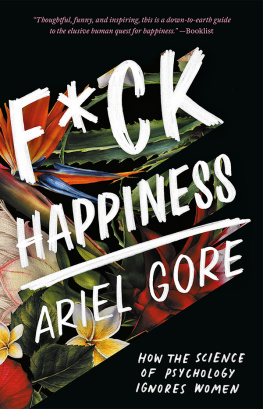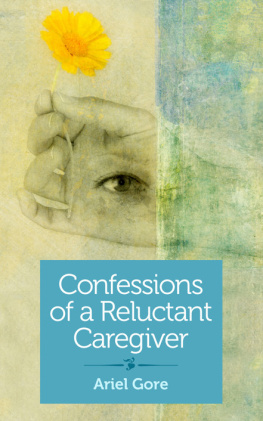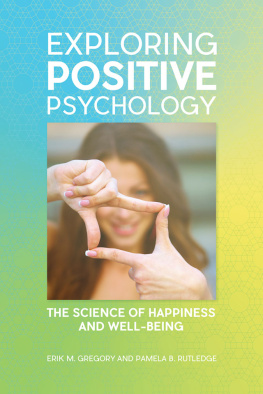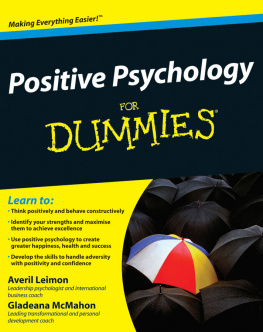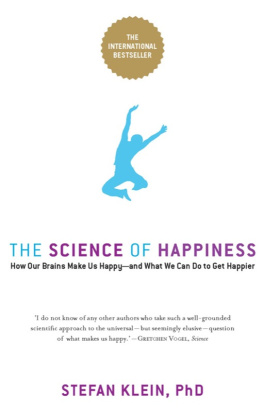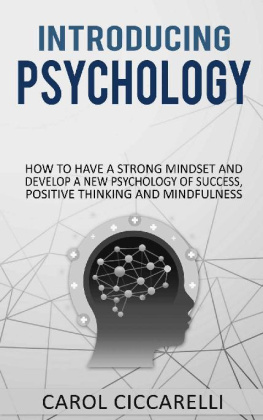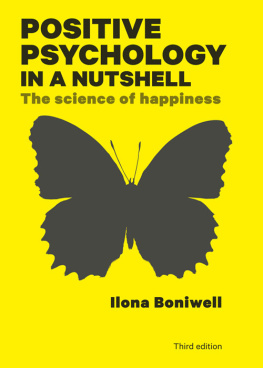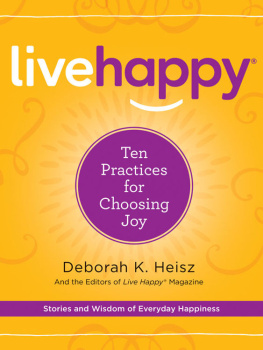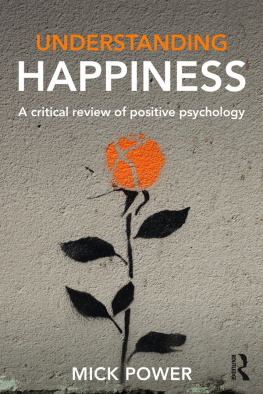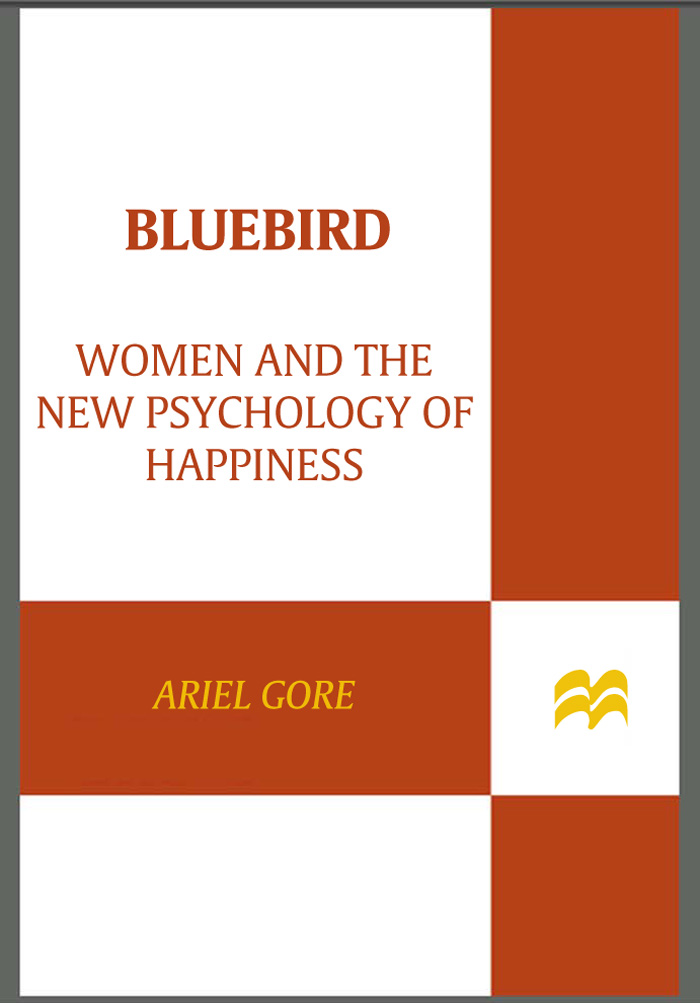bluebird
bluebird
Farrar, Straus and Giroux
18 West 18th Street, New York 10011
Copyright 2010 by Ariel Gore
All rights reserved
Distributed in Canada by D&M Publishers, Inc.
Printed in the United States of America
First edition, 2010
Grateful acknowledgment is made for permission to reprint an excerpt from Midrash on Happiness, by Grace Paley, from Long Walks and Intimate Talks by Grace Paley and Vera B. Williams. Copyright 1991 by Grace Paley. Used by permission of the Feminist Press at the City University of New York.
Library of Congress Cataloging-in-Publication Data
Gore, Ariel, 1970
Bluebird : women and the new psychology of happiness / Ariel Gore 1st ed.
p. cm.
Includes biblographical references.
ISBN 978-0-374-11489-3 (hardcover : alk. paper)
1. Women. 2. Happiness. I. Title.
HQ1155.G67 2010
305.42dc22
2009015677
Designed by Abby Kagan
www.fsgbooks.com
1 3 5 7 9 10 8 6 4 2
The names of some of the individuals whose journal extracts are featured in this book have been changed.
also by ariel gore
NONFICTION
How to Become a Famous Writer Before Youre Dead:
Your Words in Print and Your Name in Lights
Whatever, Mom: Hip Mamas Guide to Raising a Teenager
Atlas of the Human Heart
The Mother Trip
The Hip Mama Survival Guide: Advice from the Trenches
NOVELS
The Traveling Death and Resurrection Show
ANTHOLOGIES
The Essential Hip Mama: Writing from the Cutting Edge of Parenting Breeder: Real-Life Stories from the New Generation of Mothers
Be strong. We have the right to make the universe we dream. No need to fear science groveling apology for things as they are, ALL POWER TO JOY, which will remake the world.
DIANE DI PRIMA
bluebird

WOMEN AND
THE NEW PSYCHOLOGY
OF HAPPINESS

ariel gore
FARRAR, STRAUS AND GIROUX
NEW YORK

preface

I must have been about nine years old when my paternal grandmother gave me the gift of a small glass bluebird. Its a symbol of happiness, she told me.
I turned it over in my hand. Why? I asked. Id already learned that the color blue represented sadness.
My grandmother smiled at me, then frowned. Ariel, she said gravely. You ask too many questions. A nice young lady doesnt ask so many questions.
I put the glass bluebird in my hip pocket.
Now smile and say Thank you, my grandmother instructed me.
I smiled and said Thank you, but I kept on asking too many questions.
introduction

When I was a twenty-year-old single mom and freshman in college, I signed up for a psychology and literature course because it was offered at the precise hour for which Id found a babysitter. A small magical coincidence, it turned out, because there on the required reading list I came upon the dearest bookA Life of Ones Own by the British psychotherapist Marion Milner. Originally published in 1934 under the pseudonym Joanna Field, the narrative follows Milners seven-year study of living that began with a diary she started keeping when she was twenty-six years old. Her idea was that if she recorded the best moments in her daily life, she might begin to trace patterns from those moments and discover the conditions for lasting happiness. I marveled at the concept. What an embarrassingly simple idea.
Id been traveling since I left home and school four years earlier. Because I was in almost-constant motion, the rhythm of a night train had become as familiar as my own heartbeat. Id returned to California to start college only because the vagabond lifestyle proved tricky with a baby. Id been running from depression and psychic death, searching and tripping in a mad-dash quest for... what? I wanted to prove to myself that I could survive without all the things the world told me I needed in order to survive, but I was seeking something, too. I hoped to find the antidote to depression, but I wouldnt have called it happiness at the time.
I mean, happiness was so uncool.
At best, happiness meant you were shallow and disconnected. More likely, it meant you were dumb. How could anyone be happy when the world was such a war-torn and miserable place? Happiness was hokey, optimism for dimwits. In my philosophy class Id just written a paper arguing that human nature was basically mean-spirited. Still, I nursed my daughter to sleep and stayed up late California nights reading that little book called A Life of Ones Own. It shocked my imagination that one womans humble search for happiness might be an intellectual pursuit worthy of college-level inquiry. It reminded me of night trains and made me feel safe to see that an educated writer like Milner could admit that she, like me, didnt really know what she wanted. Perhaps if one really knew when one was happy one would know the things that were necessary for ones life, she wrote.
Before I even finished the book, I started my own diary. I didnt write every day, but when I remembered and when I had time, I picked out the moments in which Id been particularly happy and recorded them on lined pages.
Life isnt as simple as a series of inspirations and consequences, of courseall kinds of things influence us and bend our destiniesbut I think its fair to say that it was from those fragments and scribbles of experience that I found the thread that would embolden me to build the creative life and independent family I could nurture and be nurtured by as I stepped into adulthood.
Fast-forward fifteen years. Im a full-time writer and the mother of a teenager. A cold spring afternoon and Im stuck in traffic, listening to NPR, when an announcer notes: At Harvard University this semester, students are flocking to a new class that might give them some insight into the secret to happiness. Psychology 1504or Positive Psychologyhas become the most popular course on campus.
I thought of my freshman year and smiled. Harvard had finally caught up with the little California hippie college where Id spent my first two years as an undergrad. When I got home, I searched for the class on the Internet and downloaded the syllabus. I would read along with the Harvard kids, I decided. I had long since forgotten about A Life of Ones Own, but in recent years Id noticed a growing disconnect between the things I imagined would make me happy and the things that actually did. Potentially ego-boosting rites of passage in my career, for exampleawards or good reviewsonly seemed to cause me anxiety. Allowing myself to be absorbed in my work, on the other hand, whether it was writing or teaching or doing some familial chore I outwardly complained about, brought a quiet contentment I could feel radiate from my chest.
Id always kept an irregular journal, but as I looked back through those pages now, I was embarrassed by the litany of complaints. In February, I was tired and stressed-out. In April, a friend had spited me. One night in June, Id stayed up until dawn worrying about my daughter. And in August, I pretty much despised everyone Id ever met. Id recorded all the things that made me


